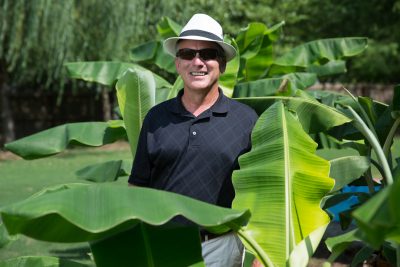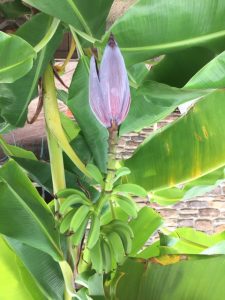Albert Einstein taught himself the violin and would play duets with Max Planck, fellow Nobel Prize winner and the “Father of Quantum Theory,” on piano. Marie Curie rode her bicycle to clear her mind and relax. And Erwin Schrodinger – of Schrodinger’s cat fame – crafted dollhouse furniture.
Outside the Lab highlights our faculty’s non-academic pastimes that help keep them focused through creative pursuits.
Ralph Henry’s hobby is bananas. Literally.
More than a decade ago Henry, chair of the Department of Biological Sciences, was at a gathering in his east Fayetteville neighborhood when an acquaintance started talking about banana plants that he was growing in his yard.
“He said, ‘Ralph, you’ve got to have a banana plant,’” recalls Henry, whose expertise includes plant proteins.
The neighbor gave Henry a single plant. At first, he wasn’t sure what to do with it.
“I figured that if I killed it, no one would care,” he said. “When the weather cooled down, I cut off the top, put it in a bag and stored it in my garage for the winter.”
Banana plants are grown primarily in tropical regions like South America, Central America and the Caribbean. But it turns out the plants are able to thrive during Fayetteville’s warm, humid summers and survive the mild winters with proper care.
There are now about 120 banana plants goring on the north side of Henry’s deck, which he refers to as his “little Havana.” All of them came from that first plant. He would have more – but he gives away 30 to 40 of the plants each spring. The plants didn’t produce fruit until 2015.
“None of the eight banana fruits were larger than my thumb and they tasted terrible,” Henry said. “But I grow the banana plants for their ability to transform my deck into a tropical paradise where stress just drips away… no flight to the Caribbean required.”






You must be logged in to post a comment.